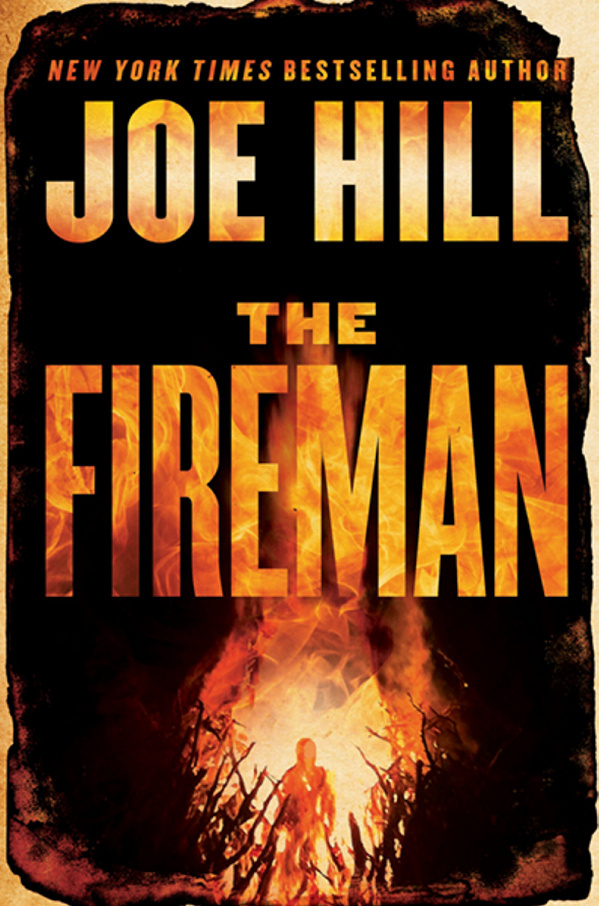Haven’t all the good apocalypses been taken by now? Is there any doomsday scenario left that hasn’t been exploited for its entertainment value?
Those are the questions facing Exeter, New Hampshire, author Joe Hill as he delivers “The Fireman,” his massive account of one young woman’s experience of the rapid, fiery fall of civilization. The older son of Stephen King, Hill attempts to put his own distinctive stamp on a subgenre that has captured the popular imagination for decades and now seems more relevant with each depressing news cycle.
As “The Fireman” opens, Harper Grayson is a dedicated elementary school nurse, and she possesses the perfect temperament for the job, nearly matching Mary Poppins when it comes to doling out sweetness, compassion and grace under pressure. Like everyone else, though, she is caught off guard when a mysterious, spore-borne plague begins to spread across the country. People spontaneously combust, bursting into flame after their bodies have been marked by black and gold fungal blemishes known as “Dragonscale.” New Hampshire seems to be under martial law, and much of the state of Maine is one giant inferno.
Committed to volunteering at Portsmouth Hospital, Harper spends 18 hours out of 24 in a full-body rubber suit that had been designed to repel Ebola. Even such precautions can’t prevent her from contracting Draco Incendia Trychophyton. When her would-be-writer husband, Jakob, discovers that she’s infected, he almost immediately assumes that he, too, is doomed. He insists that they should make plans to take their own lives together, before they individually go up in smoke. The fact that Harper is pregnant with their first child does not deter Jakob in the least.
For all her sweetness, though, Harper has a fierce will to live and to protect her unborn child. She receives help from John Rookwood, also known as The Fireman, a mysterious figure who speaks with an English accent, carries a formidable excavation tool known as a halligan bar and wears a dirty yellow firefighter’s jacket. Thanks to Rookwood’s assistance, she’s able to escape her unhinged husband’s clutches and make her way to refuge at Camp Wyndham, a summer camp converted into a sanctuary for those afflicted with ‘scale. There she meets a group of survivors who claim to have found a way to control their infection, to use its mind-altering properties in a spiritual communion that limits the possibility that they will suddenly burn to death.
Hill knows that many readers will have other post-apocalyptic novels in mind as they follow Harper’s journey, chief among them “The Stand” and Cormac McCarthy’s “The Road.” He doesn’t let those inevitable associations hinder him, though. He acknowledges his literal and literary forebears, cheerfully sprinkling the text with references to the Stephen King multiverse, from “Rita Hayworth and the Shawshank Redemption” to “Firestarter” and “The Dark Tower” sequence of fantasy novels.
Although Hill employs a wide narrative canvas, he keeps his focus tight, concentrating on a handful of vivid characters operating mostly within the limited geographic area of the New Hampshire Seacoast. Much of the action takes place in and around Camp Wyndham, and the creepy conformity of the refuge’s leadership will remind readers of Shirley Jackson’s “The Lottery.” Dissident campers are forced to keep stones in their mouths as penance, a perfect metaphor for their fear of people speaking against them.
As bad as some of the campers are, however, their villainy pales in contrast to Jakob’s new band of friends. The self-styled Marlboro Man spews vitriol over the abandoned airwaves, and he and his Cremation Crew are often on patrol, looking for “burners” they can murder in the name of contagion containment. It’s inevitable that they and Harper’s hidden community will clash calamitously.
Although nearly 800 pages, “The Fireman” never feels like a slog. Hill definitely knows how to ratchet up the suspense, even if he sometimes relies too heavily on “had they but known!” chapter endings. There’s plenty of well-choreographed physical action and artfully employed plot twists, but it is Harper’s developing relationship with John Rookwood that proves to be the heart of the novel. Both strive mightily to maintain their basic decency as the world falls apart, and their acts of unselfish courage are what make “The Fireman” more than simply another example of disaster porn.
Without giving too much away, it can be said that aspects of the ending of “The Fireman” seem a little too neat. Most readers probably won’t be bothered by the slight air of contrivance, given the quality storytelling Hill has delivered until that point.
Berkeley writer Michael Berry is a Portsmouth, New Hampshire, native who has contributed to Salon, the San Francisco Chronicle, New Hampshire Magazine, the Los Angeles Review of Books and many other publications. He can be contacted at:
mikeberry@mindspring.com
Twitter: mlberry
Send questions/comments to the editors.


